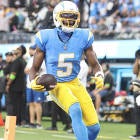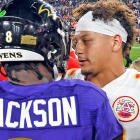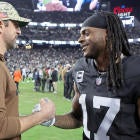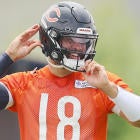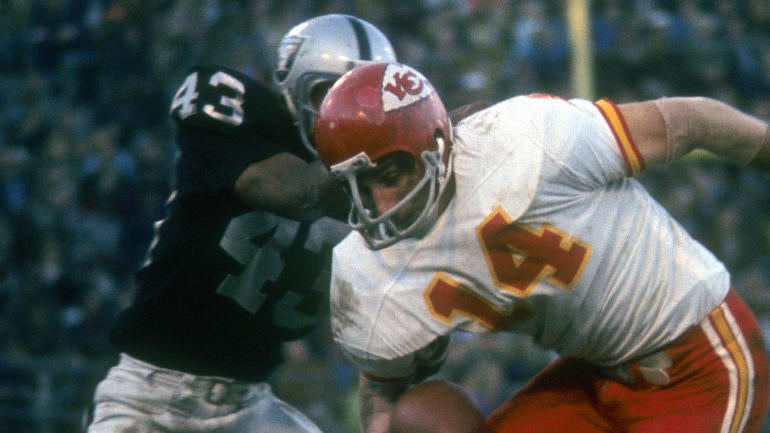
The NFL was fighting for real estate as the league entered the 1960s. Not only was the NFL trying to surpass baseball as America's No. 1 pastime, the league also had to compete with the newly-formed American Football League, a league that was comprised of colorful jerseys, creative team names and rules that encouraged higher scoring games.
The success of the AFL, along with the continued growth and success of the NFL, led to a boom in pro football's popularity during the '60s. By the end of the decade, the leagues' two champions would start playing an annual game against one another in a spectacle now known as the Super Bowl. Also helping the growth of pro football during this time was the budding of new rivalries, rivalries that are just as relevant today as they were six decades earlier.
With the recent conclusion of the NFL's 100th season, we decided to take a look at pro football's top five rivalries during the '60s, rivalries that helped pro football climb to its current heights.
5. Oilers vs. Chargers (AFL)
Overall head-to-head record during the decade: Chargers, 12-7
Playoff record during the decade: Oilers, 2-0
Longest winning streak: 8 (Chargers)
Best game: 1960 AFL Championship - Oilers 24, Chargers 16
The AFL's first two powerhouse teams, the Oilers and Chargers faced each other in the league's first two championship games. Their first championship meeting, played at the end of the 1960 season, put the finishing touches on the AFL's successful inaugural season.
After splitting their season series against the AFL Western Division champion Chargers, the Oilers, winners of the AFL Eastern Division, would face Los Angeles for a third time in the 1960 AFL Championship Game. The Oilers' defense intercepted Chargers quarterback Jack Kemp twice, while their offense received a legendary performance from quarterback George Blanda, whose 301-yard, three-touchdown performance included an 88-yard touchdown pass to Billy Cannon that proved to be the game-clinching score.
While the Oilers would again have their number in the '61 championship, the Chargers would finally break through in 1963, sweeping the season series against Houston en route to a 51-0 demolishing of the Patriots in the AFL title game. The Chargers, led by Hall of Fame receiver Lance Allworth, would finish as the AFL's runner-up in '64 and '65. In the process, they won 10 of their final 11 games against the Oilers, who made it back to the AFL title game in '67, losing to the Raiders, 40-7.
January 1, 1961
— Old Time Football 🏈 (@Ol_TimeFootball) January 31, 2020
The first AFL Championship has the #Oilers vs #Chargers
Kemp 21-41-171-0-2
Blanda 16-31-301-3
Paul Lowe 21-165-1
Hennigan 4-71
Smith (19-45 5-52-1) scores the first TD pic.twitter.com/QCv5MQ183Q
4. Browns vs. Giants
Overall head-to-head matchup during the decade: Browns, 12-6-1
Longest winning streak: 6 (Browns)
Best game: December 17, 1961 - Giants 7, Browns 7
Two of the NFL's best teams during the decade, the Giants and Browns represented the NFL Eastern Division a combined six times in NFL title games during the '60s. The Browns, led by Hall of Fame running back Jim Brown and Hall of Fame receiver Paul Warfield, appeared in four NFL title games that included a 27-0 whipping of Johnny Unitas and the Colts in the '64 title game.
Deadlocked in a tight division race with the defending champion Eagles, the Giants needed either a win or a tie against the Browns in the final week of the 1961 regular season. While the Browns had nothing to play for, they gave the Giants all they could handle, with Brown rushing for 102 yards. Trailing by a touchdown following Y.A. Tittle's first-quarter touchdown pass to Joe Wells, the Browns tied the score in the fourth quarter on a 35-yard touchdown pass from Milt Plum to Leon Clarke. Fortunately for the Giants, the Browns wouldn't score again, as New York edged the Eagles for the division crown and a shot against Green Bay for the NFL title. The Giants, who appeared in back-to-back NFL title games in 1961 and '62, lost both games at the hands of the Packers, who dominated the decade by winning five titles in a seven-year span.
The Giants would again beat out the Browns for the division title in '63 before falling to the Bears in the NFL Championship Game. Cleveland finally broke through in '64, sweeping the Giants that season before winning the franchise's fourth -- and most recent -- championship.
“Old Days”Legendary Announcer Chris Schenkel describes a Memorable Day in Cleveland History,the 1964 Colts-Browns 1964 NFL Championship Game.#Browns #Cleveland #Colts #baltimore #1960s #NFL
— Tom's Old Days (@sigg20) December 16, 2019
pic.twitter.com/8H8ygAGWHu
3. Bears vs. Packers
Overall head-to-head matchup during the decade: Packers, 15-5
Longest winning streak: 5 (Packers, 1960-62)
Best game: September 24, 1967 - Packers 13, Bears 10
While the Bears-Packers rivalry dates all the way back to the 1920s, the rivalry added a new chapter to its rich history in 1963, when the Bears dethroned the Packers as NFL Western Division champions before besting the Giants for the NFL title. But despite acquiring two Hall of Famers (linebacker Dick Butkus and running back Gale Sayers) during the 1965 draft, the Bears, who also featured Hall of Fame tight end Mike Ditka, failed to make it back to another NFL title game during the decade, as the deeper, more talented Packers always seemed to stand in Chicago's way.
Despite its shortcomings, Chicago managed to give Green Bay everything it could handle during the '66 and '67 seasons. In Week 2 of the '67 season, the Packers, despite holding a 24-5 advantage in first downs gained, needed a late field goal by Don Chandler to defeat the Bears, who picked off Hall of Fame quarterback Bart Starr five times. With Starr neutralized, the Packers turned to running back Jim Grabowski, who gained 111 of the Packers' 233 rushing yards on the afternoon.
Despite a 117-yard, one-touchdown performance by Sayers in the 1967 rematch, the Bears fell short again against the Packers, as Starr enjoyed a much better performance in Green Bay's 17-13 victory in Week 11. The Packers' hard-earned season sweep of the Bears helped them capture another division title. In January, Green Bay defeated the Rams, Cowboys and Chiefs to capture its fifth and final championship of the '60s. And while Butkus and Sayers never made the playoffs, they were both members of the NFL's 100th Anniversary Team.
Gale Sayers was one of the shiftiest dudes to ever lace 'em up 💯 @ChicagoBears pic.twitter.com/FwiSYZdJsL
— NFL Throwback (@nflthrowback) May 31, 2019
2. Raiders vs. Chiefs (AFL)
Overall head-to-head matchup during the decade: Series tied, 11-11
Playoff record during the decade: Series tied, 1-1
Longest winning streak: 4 (Chiefs, 1961-62; Raiders, 1968-69)
Best game: 1969 AFL Championship - Chiefs 17, Raiders 7
The first franchise to win the AFL title, the Chiefs held the upper hand in their matchups against the Raiders before Oakland began to turn things around in 1963, when Al Davis took over as the team's head coach. By 1967, the Raiders had supplanted the Chiefs as the AFL's premier team, as Oakland posted a 7-1 record against Kansas City from 1966-69. That stretch included Oakland's 41-6 divisional round playoff win over the Chiefs. The Raiders, who won the AFL title a year earlier, would not make a return trip to the Super Bowl, coming up short against Joe Namath and the eventual world champion Jets in the '68 AFL title game.
Despite losing both of their regular season games against the Raiders, Kansas City still managed to post an 11-3 record during the 1969 season. After upsetting Namath and the Jets in the divisional round, the Chiefs earned a trip to Oakland for the right to go to the Super Bowl. With the score tied in the third quarter, and with the Chiefs facing a third and long just outside their own end zone, Kansas City quarterback Len Dawson found receiver Otis Taylor for a 41-yard gain. The play helped set up Robert Holmes' go-ahead touchdown, as the Chiefs became the last team to capture an AFL title.
A week later, the Chiefs, who fell short against the Packers in Super Bowl I, defeated a talented Vikings squad in Super Bowl IV. Dawson took home the game's MVP award, as the Chiefs won the final game before the AFL and NFL merged during the offseason.
OTD 1970
— Kevin Gallagher (@KevG163) January 5, 2019
° 1969 AFL CHAMPIONSHIP °#Chiefs notch the franchise's unprecedented third AFL title in the tenth and final AFL title game, besting the Raiders in Oakland, 17-7.
A defensive struggle marked by traded turnovers and a crucial officiating callhttps://t.co/VipXpmVYKy pic.twitter.com/HcAPDLDG95
1. Packers vs. Cowboys
Overall head-to-head matchup during the decade: Packers, 6-0
Playoff record during the decade: Packers, 2-0
Best game: 1967 NFL Championship - Packers 17, Cowboys 14
You're probably wondering how this matchup is No. 1 on this list, given the Packers' overwhelming success over Dallas during this particular era. While the Packers did win each of their matchups against the Cowboys during the '60s, the two championship games the teams played against each other were two of the greatest games in NFL history up until that point. The level of drama in those games, as well as the tremendous level of play on display on both sidelines, considerably rose the popularity of not only the NFL. It also brightened the star of the Cowboys, whose gamely performances in those championships -- played in front of national TV audiences -- helped create their eventual status as "America's Team."
After needing a goal-line stand to hold off the Cowboys in its 34-27 victory in the '66 NFL title game, Green Bay hosted Dallas in the '67 title game, a game that is better known as the "Ice Bowl." Not only did the Packers have to contend with a -13 degree temperature, they also had to overcome a late deficit after the Cowboys took a 17-14 lead on halfback Dan Reeves' 50-yard touchdown pass to Lance Rentzel.
With 4:50 left and 68 yards away from the end zone, Starr methodically chipped away at the Cowboys' defense, throwing safe, intermediate passes to running backs Donny Anderson and Chuck Mercein. With 16 seconds left, the Packers faced a third-and-goal at the 1-yard line. After using his final timeout to talk things over with Lombardi, Starr called "31 Wedge," a running play for Mercein. But instead of handing off, Starr decided to keep the ball on a quarterback sneak. Following Hall of Fame guard Jerry Kramer's blocking, Starr barreled his way over the goal line, giving the Packers another thrilling victory over Tom Landry's Cowboys. Green Bay would go onto win its second consecutive Super Bowl, a 33-14 win, over the Raiders.
On this date in 1967...
— Green Bay Packers (@packers) December 31, 2019
❄️ The Ice Bowl ❄️#NFL100 | #GoPackGo pic.twitter.com/SOVA2sAUtr











